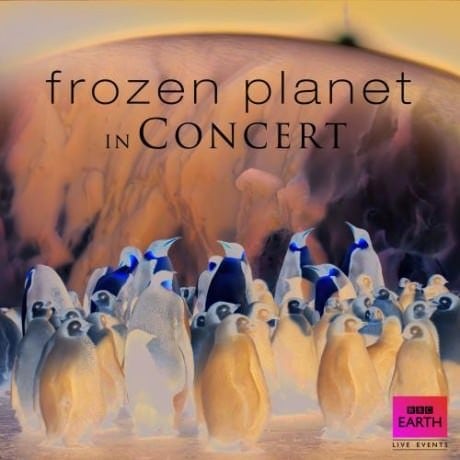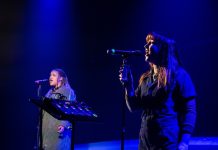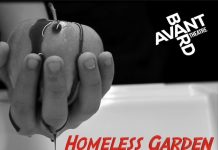This Friday, June 28th at 8:30 PM. Frozen Planet in Concert will turn The Filene Center at Wolf Trap into a wonderland of gorgeous images and sounds of The Arctic Circle. Composer George Fenton will conduct his lush score which will be performed by the National Symphony Orchestra. George Fenton takes us on his journey of composing the score for Frozen Planet.
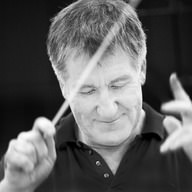
Joel: What will audiences experience when they come to Wolf Trap to see Frozen Planet in Concert?
George: What they’ll see is really the highlights of the series Frozen Planet, specially prepared for the concert. The pictures have all been recut in order that the orchestra can play effectively as a concert the music from Frozen Planet. They will play for the most dramatic and in some cases comic sequences from the series. There are also sequences of music that aren’t in the series. It’s not the series, it’s a concert and it has a beginning, middle and end. There is music in it that was written just for the concert and there is footage that was specially prepared for the concert.
Please take us on the journey of writing the score for Frozen Planet:
How long did it take you to compose it?
I did research for a month or so. I actually travelled to the Arctic as part of that research, and then it took me about six months to compose. I went to the Arctic for 4 or 5 days and went on a reccy with the crew and it was very interesting, particularly just to get a sense of its space and that really was something that informed what I wrote. Then I came back and worked on it as a film, just like I would normally. It took about six months to write all the music, because there’s quite a substantial amount of music in the program.
How would you describe your score? What styles of music are in the score?
In the orchestral writing, I tried to get a sense of the stillness of the place. There are, also, to me, are certain characteristics in music from the north. There isn’t a whole lot of music to listen to from the Antarctica, but within the Arctic Circle there is music to listen to. I do employ some of the influences of Nordic fiddle music, but like any film, the film itself will demand certain things of the music. You can’t just write from your head, like here’s my symphony for the Arctic because it won’t serve the film. In the end the action and the rhythm of the cutting and all the things that normally inform film music, do in the case of Frozen Planet as well.
Was the score composed just for a symphony orchestra or can small groups of musicians play it at a screening?
The score is not only for orchestra, there are some smaller sections to the score, but in preparing it for the concert, because there is a demand for a large orchestra to play within the concert, most of the music in the concert reflects that. So the orchestra is busy for the whole evening. It couldn’t really be done without the scale. And scale is also an important thing to represent because they are vast wildernesses, these places, the Antarctic and the Arctic.
What will the rehearsal process be with the NSO when you come to Wolf Trap?
The rehearsal process will, I hope, be quite quick. It will involve us running though the music first, and then playing with the picture. The key to the concert’s success is the orchestra and myself being able to absolutely pinpoint accurately and be able to play with the picture. We do that without any click-tracks. I do that by eye with the screen and they have to obviously be very responsive to changes in tempo that I make and things like that. Amazingly, the most helpful thing to me is that when I rehearse with them, I will turn screens around so that when they’re playing, if they do look up, they will also see a glancing look at what it is they are playing for. The footage informs the music. These films that they make, just as they were with Blue Planet and Planet Earth, they have a magic ingredient. I’m not quite sure what it is but it always seems to translate to everybody that sees it. It has this really special quality. In my experience, the orchestra benefits hugely from having the chance to see that because when they play the concert they can’t see that.
Have you performed with the NSO before and at Wolf Trap?
I’ve never performed with the NSO before at Wolf Trap. My music for Blue Planet was played at Wolf Trap, but I wasn’t able to go myself to conduct. I’m very excited to be going. I’ve never been to Washington before, so I’m looking forward to it on every level. I’m looking forward to going to Washington, and I’ve heard so much about Wolf Trap.I do know Arvind Manocha, from LA, who’s their new President and CEO.” I’m really excited to be going there. I hear it’s a fantastic venue. I’m really excited to be going there and to be working with the NSO.
What scenes in Frozen Planet thrill you the most every time you see them on the screen?
The sense of place is so important to this set of films. I do get a sense of privilege looking at Frozen Planet in a way that I don’t get when I look at other natural history films, and that’s because these regions of the world are the fastest changing on the planet and in many cases they are changing, never to change back again, because the ice is receding and so there’s lots of things you see in these films that are now history because they will never be seen in that way again. That in itself is a privilege. So far, I’ve never gotten tired of penguins, particularly the Adelie Penguins. It’s easy to forget when you watch these films and you watch the behavior in them, that many of the creatures that are being filmed have never had any contact with humans. And yet, their social interaction and the way they respond to each other makes you realize how instinctual our social behavior is because it’s so recognizable to us and yet it’s not based on any human experience. It’s based purely on their own cultural interactions. I really enjoy that when I look at those sequences of penguins, the behaviors of them. And then of course there is the big dramatic stuff. It’s amazing to see the wolves and the bison and the great grey owl.
Frozen Planet completes the trilogy. Tell us about the other two –The Blue Planet and Planet Earth. How does Frozen Planet complement the other two and is it the perfect way to complete the trilogy?
Well, when I started Blue Planet I never realized it was part of a trilogy and when I did Planet Earth I never realized that that was part of a trilogy. It’s became a trilogy. I think it’s unique in the sense that it provides with one style. Blue Planet is, as far as I know, the only comprehensive natural history of the ocean. Frozen Planet is the most complete natural history of the polar regions. And I do think that because Blue Planet shows us a world we can’t see, largely, which is the world under the water which we can visit but we can’t inhabit. Planet Earth shows us all the habitats we can visit that we in a way have a responsibility for. Frozen Planet completes the trilogy for three reasons; one, because they are the most remote and secondly, because they symbolize the way that our planet changes in the most visible and dramatic ways and thirdly because of their position on the earth and the sky above them, they are also the places we have the best opportunity to look at the next great frontier, or the last great frontier, which is outer space. So in a way it’s because the Antarctic not only tells us about our planet but it also turns around and faces the other planets and the universe. In a way it’s the perfect way to complete the trilogy about the planet we live on.
What makes you optimistic and what worries you about the way we are taking care of our planet?
What makes me optimistic is the same thing that makes me pessimistic, which is us. I worry because of man’s appetite for his own survival. We are very dominant on the planet now and woe-betide anything that gets in the way of human considerations, and so that’s a worry. What makes me optimistic is sort of a paradox because we are mammals, and mammals are currently enjoying superiority on the planet. One of the great features of mammals’ success is their ability to cooperate. And it’s that that’s made us powerful. Therefore if we actually want to make changes, rescue things, bring in new initiatives and so on, and so on, we do have a great sense of cooperation and a great sense of family and so if anything is to put right our own wrong-doings, we are at least equipped. There are people who are very exercised about how we should start to recognize what we need to do and we will eventually will all find ourselves doing it. I think people find themselves doing it now. And that’s a massive cultural shift and I think that’s really good. So I don’t feel terribly pessimistic. I feel that it may actually end up being a success story for us as a race.
What will performing at Wolf Trap add to the ambiance and message of Frozen Planet in Concert?
We couldn’t be in a more significant city in the world than to be playing this kind of concert, which in the end is something that is for pleasure and hopefully people get something from it, in many ways I hope that some people will get enjoyment just from the music. It may bring people out who don’t normally go to listen to orchestras play, which in the past is definitely true of this program. As a musician that gives me a great thrill because I’m very anxious about orchestras. If programs like this bring new audiences then then might come back into season. That, as a musician, gives me pleasure. I hope that’s one of the aspects of it. If there is an implicit message in Frozen Planet it is: here is a vital part of our infrastructure, it’s vital to what makes our world function in the way it does and it’s beautiful and we need to do our best to make sure it doesn’t disappear too quickly. It’s important that it’s performed in places that are significant in terms of opinion. I think any major city would be a good venue for Frozen Planet and Washington, particularly the seat of government, is a really good place to play anything where the implicit message is about protecting or being good guardians of the environment. But’s not really an environmentally messaged concert. That’s not its point. It’s not there to preach at all, it’s there to enjoy and wonder at. Nevertheless it’s quite nice to go somewhere where the people who wonder about it may be people who will do something about it.
What you want audiences to take with them after seeing Frozen Planet in Concert?
What I want people to take away from this is a sense of access. I think film music is about giving access to the film it’s written for. It licenses the audience to respond to footage that’s on the screen and in the concert there’s footage on the screen and there’s also a look at an incredible wonder of our world. What I hope people will go away from the concert with is a sense of access to the music, me, the orchestra and they’ll leave with a sense of access to what I say and how we play to what they see on the screen. I hope they’ll go away with a closer relationship to those things and that they find that that relationship has been worthwhile and rewarding.
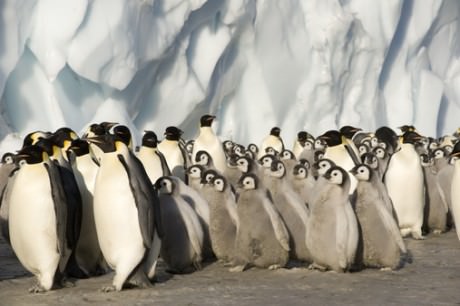
Frozen Planet in Concert plays this Friday night, June 28, 2013 at 8:30 PM, at The Filene Center at Wolf Trap -1551 Trap Road, in Vienna, VA. For tickets, purchase them online.
LINK
Frozen Planet in Concert website.
https://youtu.be/r5G1GMTbM5k


